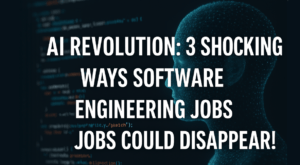AI Revolution: 3 Shocking Ways Software Engineering Jobs Could Disappear!
OpenAI CEO Sam Altman predicts that the demand for software engineers may decline as AI continues to advance. Many companies already rely on AI for over 50% of their coding, and as AI becomes more capable, it could eventually replace a significant portion of human coders. While AI currently boosts productivity, the long-term shift toward “agentic coding”—where AI autonomously handles complex programming—could reduce the need for traditional software engineers. Altman believes businesses will benefit more from monetizing AI-driven automation rather than relying on advertising models.
He advises students and professionals to focus on mastering AI tools instead of solely learning coding, as adaptability and problem-solving skills will be more valuable in the future. Instead of specializing in fixed technical knowledge, people should cultivate the ability to learn and adjust to changing technology. This shift could redefine career paths, making AI fluency a key asset. As AI reshapes industries, those who adapt will have a competitive edge in the evolving job market.

AI Revolution: 3 Shocking Ways Software Engineering Jobs Could Disappear!
Sam Altman, the CEO of OpenAI, recently shared his vision for the future of software engineering in an interview with Ben Thompson of Stratechery. His message was clear: artificial intelligence (AI) is reshaping the tech industry, and the demand for traditional software engineering roles may eventually decline as these tools grow smarter. While AI is currently boosting productivity for coders, Altman believes its long-term impact could reduce the need for human involvement in certain tasks—especially as AI systems learn to handle complex work independently.
AI’s Current Role: Boosting Productivity
Right now, AI acts as a powerful assistant for developers. Altman pointed out that many companies already rely on AI tools like OpenAI’s Codex (the system behind GitHub Copilot) to generate over half of their code. However, this doesn’t mean engineers are being replaced—yet. Instead, AI helps them work faster, automate repetitive tasks, and tackle bigger projects with fewer resources. For example, a developer might use AI to draft code snippets, debug errors, or even design entire modules, freeing up time to focus on higher-level problem-solving and innovation.
However, Altman hinted that this is just the beginning. As AI systems improve, their role in coding could expand far beyond simple assistance.
The Next Frontier: AI That Works Independently
The biggest shift, according to Altman, will come with “agentic coding”—a future where AI manages complex programming tasks with minimal human guidance. Imagine an AI that doesn’t just suggest code but independently designs, tests, and deploys software based on a user’s goals. For instance, you might describe an app idea to an AI, and it could build a functional prototype, troubleshoot issues, and refine the product without constant oversight.
While this technology is still in development, Altman sees it as inevitable. When it arrives, it could reduce the number of engineers needed for certain projects, particularly for routine or formulaic work. Startups might launch products with smaller teams, and large companies could streamline their tech departments. However, this doesn’t mean human expertise will disappear. Instead, engineers may transition into roles that require oversight, creativity, and specialized knowledge—skills that AI cannot fully replicate.
OpenAI’s Strategy: Monetizing Automation, Not Ads
Altman also discussed OpenAI’s business approach, emphasizing a focus on premium AI tools rather than advertising. Unlike companies like Google or Meta, which rely heavily on ad revenue, OpenAI aims to build advanced, paid services that solve real-world problems. For example, their automated coding assistants are designed for professionals willing to pay for efficiency gains. This strategy aligns with Altman’s belief that AI’s most transformative applications will be in automation—helping industries like healthcare, finance, and education operate faster and smarter.
Preparing for the Future: Skills That Matter
For students and professionals, Altman’s advice is clear: adapt or risk being left behind. While coding skills remain valuable today, he urges people to prioritize mastering AI tools, problem-solving, and understanding human needs. Memorizing programming languages or technical details may become less important than knowing how to collaborate with AI, ask the right questions, and apply technology to real-world scenarios.
Altman also highlighted “soft skills” such as creativity, empathy, and communication as critical differentiators. Even if AI can write flawless code, it lacks the ability to intuitively grasp user needs or navigate complex team dynamics. Engineers who combine technical expertise with the ability to translate ideas into solutions—and work seamlessly with AI—will thrive.
The Takeaway: Adaptability Is Key
Altman’s message isn’t one of doom and gloom for tech careers. Instead, he’s urging a mindset shift. The rise of AI doesn’t mean humans will become obsolete, but it does mean the definition of “technical skills” will evolve. Just as calculators changed math education (but didn’t erase the need to understand arithmetic), AI will redefine how we approach coding.
The key to staying relevant, he argues, is staying curious. Those who continuously learn, experiment with new tools, and focus on uniquely human strengths—like innovation and emotional intelligence—will find opportunities in an AI-driven world. For Altman, the goal isn’t to compete with machines but to leverage their power to achieve what neither humans nor AI could do alone.
In short, the future belongs to those who embrace change, blend technical expertise with creativity, and view AI not as a threat but as a partner in solving tomorrow’s challenges.
You must be logged in to post a comment.